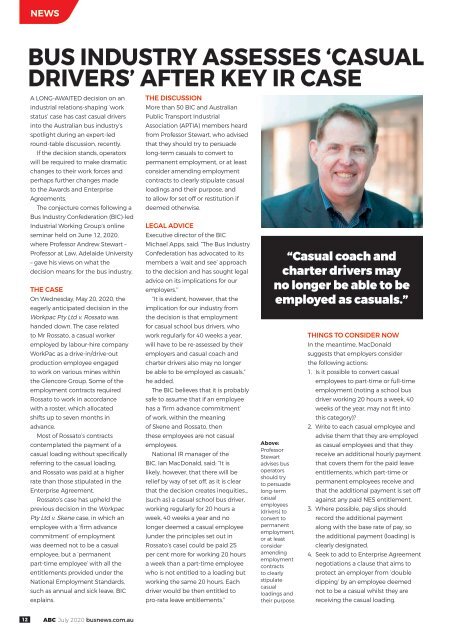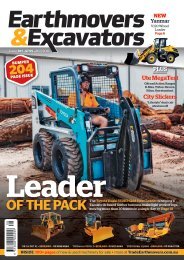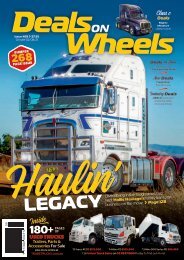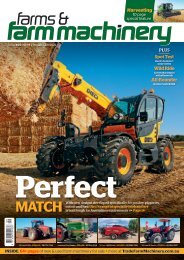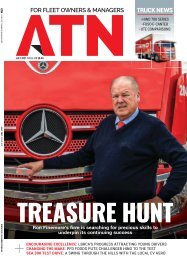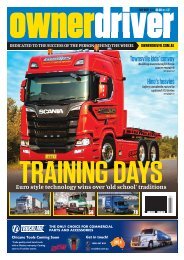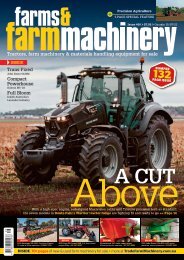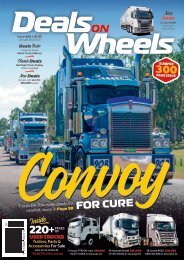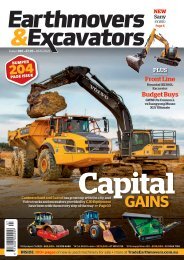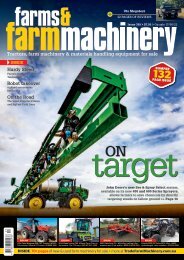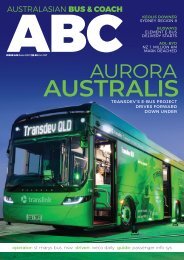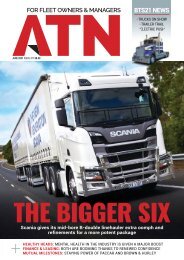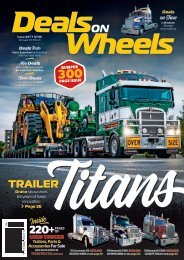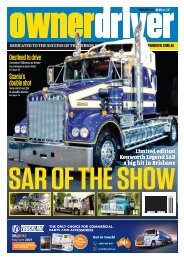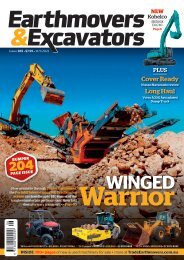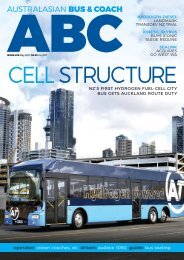ABC #395
Create successful ePaper yourself
Turn your PDF publications into a flip-book with our unique Google optimized e-Paper software.
NEWS<br />
BUS INDUSTRY ASSESSES ‘CASUAL<br />
DRIVERS’ AFTER KEY IR CASE<br />
A LONG-AWAITED decision on an<br />
industrial relations-shaping ‘work<br />
status’ case has cast casual drivers<br />
into the Australian bus industry’s<br />
spotlight during an expert-led<br />
round-table discussion, recently.<br />
If the decision stands, operators<br />
will be required to make dramatic<br />
changes to their work forces and<br />
perhaps further changes made<br />
to the Awards and Enterprise<br />
Agreements.<br />
The conjecture comes following a<br />
Bus Industry Confederation (BIC)-led<br />
Industrial Working Group’s online<br />
seminar held on June 12, 2020,<br />
where Professor Andrew Stewart –<br />
Professor at Law, Adelaide University<br />
– gave his views on what the<br />
decision means for the bus industry.<br />
THE CASE<br />
On Wednesday, May 20, 2020, the<br />
eagerly anticipated decision in the<br />
Workpac Pty Ltd v. Rossato was<br />
handed down. The case related<br />
to Mr Rossato, a casual worker<br />
employed by labour-hire company<br />
WorkPac as a drive-in/drive-out<br />
production employee engaged<br />
to work on various mines within<br />
the Glencore Group. Some of the<br />
employment contracts required<br />
Rossato to work in accordance<br />
with a roster, which allocated<br />
shifts up to seven months in<br />
advance.<br />
Most of Rossato’s contracts<br />
contemplated the payment of a<br />
casual loading without specifically<br />
referring to the casual loading,<br />
and Rossato was paid at a higher<br />
rate than those stipulated in the<br />
Enterprise Agreement.<br />
Rossato’s case has upheld the<br />
previous decision in the Workpac<br />
Pty Ltd v. Skene case, in which an<br />
employee with a ‘firm advance<br />
commitment’ of employment<br />
was deemed not to be a casual<br />
employee, but a ‘permanent<br />
part-time employee’ with all the<br />
entitlements provided under the<br />
National Employment Standards,<br />
such as annual and sick leave, BIC<br />
explains.<br />
THE DISCUSSION<br />
More than 50 BIC and Australian<br />
Public Transport Industrial<br />
Association (APTIA) members heard<br />
from Professor Stewart, who advised<br />
that they should try to persuade<br />
long-term casuals to convert to<br />
permanent employment, or at least<br />
consider amending employment<br />
contracts to clearly stipulate casual<br />
loadings and their purpose, and<br />
to allow for set off or restitution if<br />
deemed otherwise.<br />
LEGAL ADVICE<br />
Executive director of the BIC<br />
Michael Apps, said: “The Bus Industry<br />
Confederation has advocated to its<br />
members a ‘wait and see’ approach<br />
to the decision and has sought legal<br />
advice on its implications for our<br />
employers.”<br />
“It is evident, however, that the<br />
implication for our industry from<br />
the decision is that employment<br />
for casual school bus drivers, who<br />
work regularly for 40 weeks a year,<br />
will have to be re-assessed by their<br />
employers and casual coach and<br />
charter drivers also may no longer<br />
be able to be employed as casuals,”<br />
he added.<br />
The BIC believes that it is probably<br />
safe to assume that if an employee<br />
has a ‘firm advance commitment’<br />
of work, within the meaning<br />
of Skene and Rossato, then<br />
these employees are not casual<br />
employees.<br />
National IR manager of the<br />
BIC, Ian MacDonald, said: “It is<br />
likely, however, that there will be<br />
relief by way of set off, as it is clear<br />
that the decision creates inequities…<br />
(such as) a casual school bus driver,<br />
working regularly for 20 hours a<br />
week, 40 weeks a year and no<br />
longer deemed a casual employee<br />
(under the principles set out in<br />
Rossato’s case) could be paid 25<br />
per cent more for working 20 hours<br />
a week than a part-time employee<br />
who is not entitled to a loading but<br />
working the same 20 hours. Each<br />
driver would be then entitled to<br />
pro-rata leave entitlements.”<br />
“Casual coach and<br />
charter drivers may<br />
no longer be able to be<br />
employed as casuals.”<br />
Above:<br />
Professor<br />
Stewart<br />
advises bus<br />
operators<br />
should try<br />
to persuade<br />
long-term<br />
casual<br />
employees<br />
(drivers) to<br />
convert to<br />
permanent<br />
employment,<br />
or at least<br />
consider<br />
amending<br />
employment<br />
contracts<br />
to clearly<br />
stipulate<br />
casual<br />
loadings and<br />
their purpose.<br />
THINGS TO CONSIDER NOW<br />
In the meantime, MacDonald<br />
suggests that employers consider<br />
the following actions:<br />
1. Is it possible to convert casual<br />
employees to part-time or full-time<br />
employment (noting a school bus<br />
driver working 20 hours a week, 40<br />
weeks of the year, may not fit into<br />
this category)?<br />
2. Write to each casual employee and<br />
advise them that they are employed<br />
as casual employees and that they<br />
receive an additional hourly payment<br />
that covers them for the paid leave<br />
entitlements, which part-time or<br />
permanent employees receive and<br />
that the additional payment is set off<br />
against any paid NES entitlement.<br />
3. Where possible, pay slips should<br />
record the additional payment<br />
along with the base rate of pay, so<br />
the additional payment (loading) is<br />
clearly designated.<br />
4. Seek to add to Enterprise Agreement<br />
negotiations a clause that aims to<br />
protect an employer from ‘double<br />
dipping’ by an employee deemed<br />
not to be a casual whilst they are<br />
receiving the casual loading.<br />
12<br />
<strong>ABC</strong> July 2020 busnews.com.au


